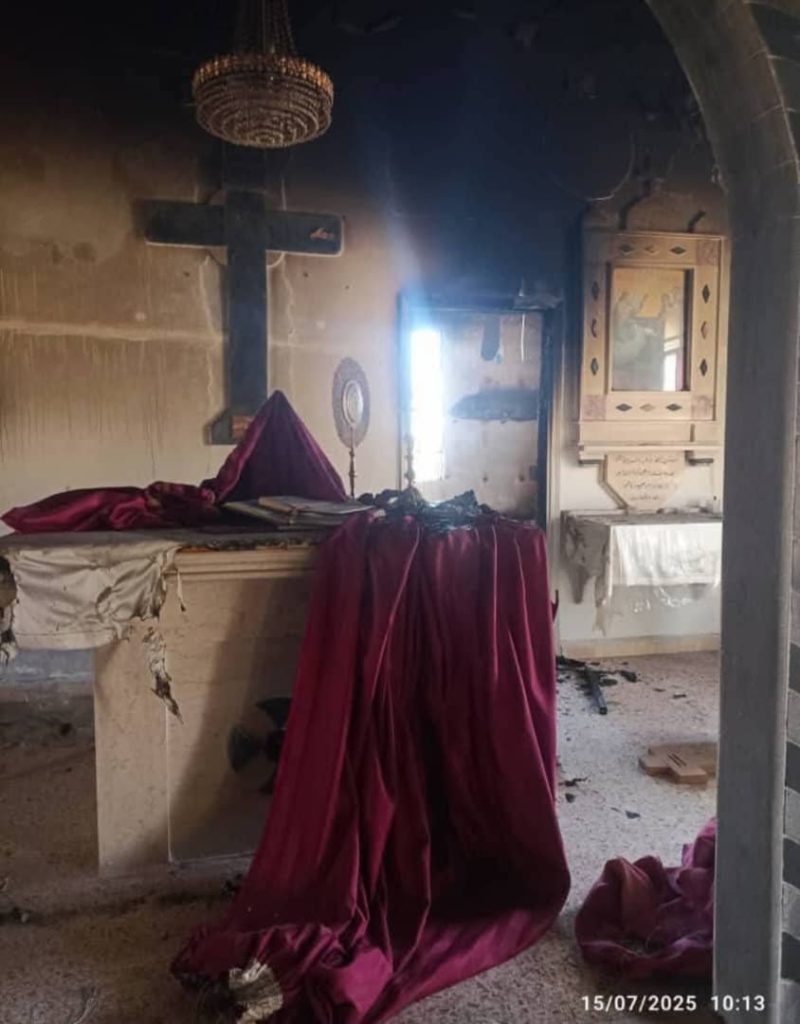As alarming sectarian violence swept through Syria in the third week of July, Christian communities in the region experienced a new wave of persecution. Attacks on the country's Christian, Druze and Alawite communities were perpetrated mainly by Islamist jihadists.
The southern district of Sweida, a predominantly Druze region with a substantial Christian population, has witnessed horrific attacks causing deaths and injuries to civilians, religious officials, and on churches and other buildings the week of July 13. These minorities are experiencing a growing deep distrust towards the Islamist-led government now in power in Damascus, a one-time al-Qaida affiliate.
The Greek Melkite Church of St. Michael in the Sweida village of Al-Sura was attacked and set ablaze by unknown assailants, according to witness accounts made to the pontifical charity Aid to the Church in Need on July 15.
Photos on social media confirm the attack, but access to the area has not been possible due to ongoing violence taking place.
Much of the recent atrocities have been leveled against the Druze community, where the death toll has exceeded 600 people, according to the Syrian Observatory for Human Rights. The escalating violence prompted neighboring Israel to intervene, in response to calls made by its own Druze community to help.
Islamist militants view the Druze -- whose religion contains elements of Hinduism, Islam, Christianity and Judaism -- as heretics.
The Druze spiritual leader Sheikh Hikmat el-Hijri has consistently kept the Syrian government from entering Sweida and demanded "international protection," which observers understand as Israeli protection.
In another recorded incident, 38 homes belonging to Christian families were destroyed by fire, leaving numerous families homeless, according to ACN. As a result, some 70 people were forced to take refuge in a church hall in Shahba, where they are fearful, living in precarious circumstances.
"This community has lost everything," one person told ACN. "They had very little to begin with -- they were already among the poorest in the region -- and now they have nothing left."
"The militias left Sweida City after killing scores of people in their homes and cars," one Christian told OSV News via Signal chat. "There are now threats that they will return, and we are very afraid. My family has packed our bags and we want to flee, but we don't know where to," the man said, who requested his name be withheld for fear of reprisal.
Violence has also reached the neighboring village of Al-Mazraa, although details remain unclear, according to ACN. "The attackers have not been identified, but the assault is believed to be linked to sectarian tensions and extremist activity that continue to plague the region, exacerbated by years of conflict and instability in the country," it said.
Elsewhere in western Syria, Syrian security forces in cooperation with residents of the village of Al-Kharibat, near Tartus, thwarted an attempted bombing of the Maronite church of Mar Elias and arrested three terrorists.
Residents, along with security forces, reacted July 13, 2025, as they found an old vehicle loaded with over 40 pounds of explosives as well as flyers, slogans, and extremist symbols parked near the church. Although the suspects were arrested, the Christian community is terrified of future attacks, according to ACN.
These incidents come less than a month after the suicide bombing of the Orthodox Church of St. Elias in Damascus's Christian Dweil'a neighborhood on June 22, which killed more than 25 people and wounded scores more during Sunday liturgy.
Syriac Catholic Archbishop Jacques Mourad of Homs expressed his concerns for Christians to Agenzia Fides, a news agency linked to Pontifical Mission Societies and the Dicastery for Evangelization.
"Syria as a country is at an end today," Archbishop Mourad said. But he also recognizes that the church in Syria must nevertheless continue its path and its work for the good of all. "Jesus wants His Church to remain in Syria. And the idea of emptying Syria of Christians is certainly not the will of God."
Archbishop Mourad underscored that it is the current Syrian leadership -- under Syrian President Ahmad al-Sharaa -- that "bears direct responsibility for everything that has happened. Because every government is responsible for the security of the people. And I'm not just talking about the Christians. Many Sunnis, many Alawites have also been killed, many have disappeared," he said.
Numerous Alawite women and girls continue to be reported missing daily on social media since a massacre of their community by security forces and gunmen linked to the country's new Islamist rulers on the western coast of Latakia in March. The U.N. Commission of Inquiry on Syria told Reuters news agency that it is investigating the spike in violence.
"We have not left our homeland -- we are staying here in Sweida," Father Toni Butros, a representative of the Greek Catholic Church in Sweida, wrote on X on July 18.
"As Christians and Greek Catholics, we stand in full solidarity with our Druze brothers and sisters as they face these horrific terrorist attacks," he said.

